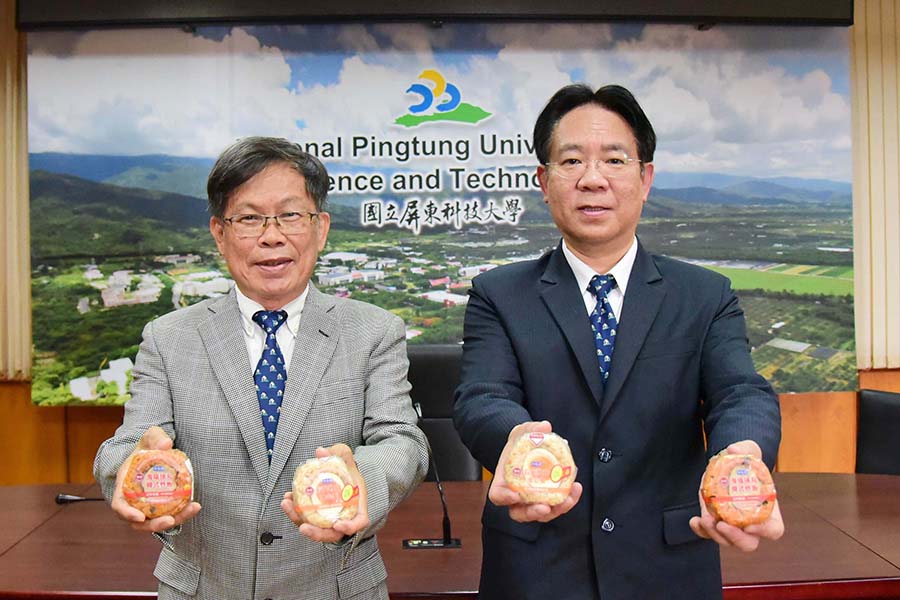The NPUST International Service Center for Irrigation R&D has developed a “System of Probiotic and Rice Intensification” (SPRI), which can reduce irrigation water usage by 30% when compared with conventional farming methods. As part of their method, probiotics are added to the field to diversify the microorganisms in the soil, make the environment healthier, and reduce fertilization frequency—and thereby reduce personnel costs. It not only saves water, fertilizer, chemicals, and manpower, the results of the research show that when this method is used to cultivate one hectare of land, it can reduce carbon emissions by about 5.3 metric tons. This “low-carbon rice” was recognized by Uni-President Enterprises Corporation’s 7-ELEVEN, which is now cooperating with the team from NPUST to launch the first “low-carbon rice balls”, based on recipes for two popular rice ball products (Hai Rei Foods Korean Fried Rice Ball and Shin-An Farm Soft Boiled Egg Rice Ball). The new campaign was launched on April 19th at limited 7-ELEVEN outlets in Taiwan.
NPUST promotes sustainable activities and green industry development and their cooperation with Uni-President’s 7-ELEVEN is of special significance with its proximity to “Earth Day”, on April 22. The aim is to “expand low-carbon catering” and “promote circular economies” so that NPUST can richly cultivate local social responsibility and develop its own University Social Responsibility (USR). Joining hands with 7-ELEVEN, the largest supermarket channel in Taiwan, academic and corporate sectors can spread the benefits to every corner of the society.
The International Service Center for Irrigation R&D, which is headed up by Professor Yu-min Wang, developed the commercial application of “low-carbon rice planting”. Using the product-traceability-certified Tainan No. 11 rice, they are working to innovate agricultural biotechnology. Through application of systematic big data analysis, employment of probiotic organic fertilizers, and the strengthening the rice root systems, they are able to revitalize farmland ecosystems. The sustainable environmental farming method can reduce water use by 30% when compared with ordinary rice cultivation, thus allowing for food production to be done in a way that protects the earth’s resources. By expanding the use of this rice to 7-ELEVEN rice ball products, the two parties are doing more than creating a business opportunity, they are also creating ways for customers to respond to sustainable causes through the purchasing of products.
Shin-An Farm Soft Boiled Egg Rice Balls use a golden ratio blend of Taigen No. 9 and Tainan No. 11 low-carbon rice together with Shin-An Ranch Dongfu eggs to create a delicious Japanese style rice ball. Sale of this product have been launched at 2,400 stores in the greater Taipei area and Taichung. The Hai Rei Foods Korean Fried Rice Balls also make use of a blend of Taigen No. 9 and Tainan No. 11 low-carbon rice. A Korean style cooking method from a famous third-generation shop in Hsinzhu is used to make the flavor-filled rice balls which have been launched at 6,400 outlets around Taiwan (the sales area excludes outlying islands and the east coast).
The two new flavors of rice balls are expected to become popular products at 7-ELEVEN. At the same time, they serve as very concrete examples of NPUST’s efforts to pursue the UN’s SDGS, including SDG2 (hunger eradication), SDG12 (responsible consumption and production), and SDG17 (partnerships). The rice production technology has been patented, and in the future, once NPUST’s application for a school-run enterprise is approved, it will be a prioritized item of focus for technical service projects in the effort to achieve low-carbon agriculture in Taiwan. The team even has a vision of extending this service to the world to maximize its sustainable influence.

